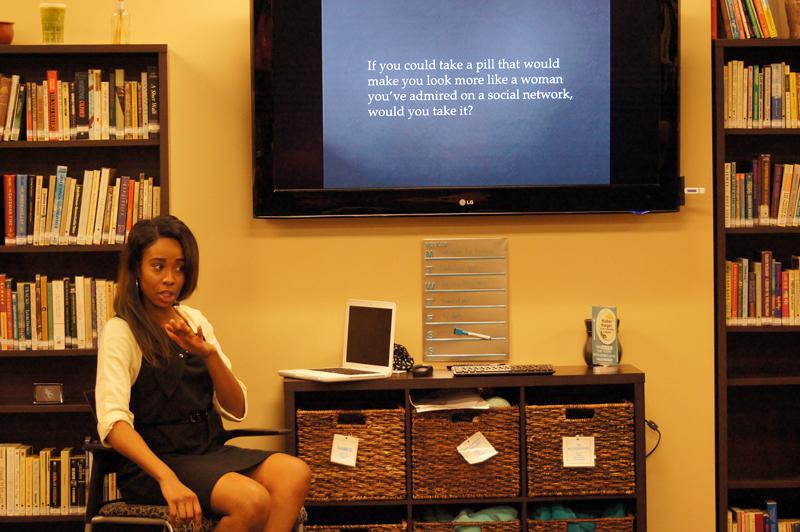
Just like a mirror, social media sites like Facebook reflect the users, but the images staring back are not always truthful.
Tools such as Adobe Photoshop, Instagram filters and virtual makeover sites allow people to alter photos until they are almost unrecognizable. Snapshots of the past have been replaced with digital smoke and mirrors.
MU Women’s Center staffer Jasmin James presented her thoughts Wednesday regarding how these tools and social media cause people to present themselves a certain way for validation.
“To post on a social network is like your own branding,” James said. “You’re branding yourself, so for branding purposes you want everything to look flawless. We aim for perfection, and that’s why we edit our pictures.”
Audience member Sarah Rolufs admitted to editing her pictures using Instagram filters.
“They enhance the photos and, personally, they make me feel better about myself, even though I know that’s not a true photo of me,” Rolufs said. “I like the validation of other people liking my pictures and liking my posts.”
Despite the self-esteem boost that “likes” and comments on these edited photos can provide, James cautioned against relying too much on social media to seek approval from others.
“I think we choose to use social media to promote a certain identity,” James said. “You can easily get sucked up into this idea of everything I think is beautiful about myself has to also be validated on a network or else it’s not beautiful to me anymore. That’s dangerous.”
James also discussed her observations of the current trend of taking “selfie” photos as well as sexually suggestive photos of body parts that generate shallow attention rather than meaningful admiration.
“If we’re posting pictures and it’s not of our faces, we’re sort of chopping ourselves up into these pieces and not really giving people an opportunity to see us as we are,” James said.
Rolufs said she thinks people take attention-seeking photos such as these in order to feel validated by friends and strangers alike.
“I think a lot of modern society defines themselves by their visibility,” Rolufs said. “I think the fear of not being visible keeps a lot of people on social networking sites.”
James said this desire to be visible can be negatively reinforced with other people’s desire to people-watch.
“We have to learn how to not be so voyeuristic,” James said. “If you sit on a social network and are constantly editing your pictures and checking other people’s pictures, you can lose time and actual things that are going on in the present.”
Audience member Kellcie Fields, who refrains from photo editing and overusing social media, echoed James’ sentiments.
“My life is going to be out here and not just on the computer,” Fields said. “It’s more important to be in your own moment, one that’s not just about what you want other people to see. Just enjoying being where you are and not worrying about what someone else is liking.”
James said she hoped her presentation would help people notice how consuming social media can cause people to lose sight of reality and their natural beauty.
“Are we fixing ourselves on these pictures to represent ourselves or to represent how we want ourselves to look?” James said. “It’s more important to discover and define your own beauty and not let social networks do that for you.”